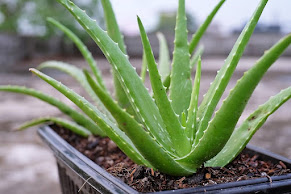MEDICINAL PLANT
1. Aloe Vera
Aloe vera is a versatile and popular medicinal plant known for its many health benefits, especially in skincare and digestive health. Aloe vera is a succulent plant with thick, fleshy, and spiky leaves.The inner part of the leaf contains a clear gel, which is used for its medicinal properties, while the outer leaf layer contains latex (a yellowish substance).
Aloe vera has a wide range of uses, especially for its skin and digestive benefits.
Nutritional Profile:-
Aloe vera gel contains several important vitamins and minerals that contribute to its health benefits:
- Vitamins: A, C, E, B12, folic acid
- Minerals: Calcium, magnesium, zinc, potassium
- Amino Acids: Contains 20 of the 22 essential amino acids, including all 8 essential ones.
- Enzymes: Including amylase and lipase, which assist in the digestion of sugars and fat.
2. Tulsi
Medicinal Uses of Tulsi:-
Tulsi has a long history of use in traditional medicine, especially in Ayurveda, where it is considered an adaptogen (a substance that helps the body cope with stress) and a powerful herb for maintaining overall wellness.Safety and Precautions:-
Pregnancy and Breastfeeding: Tulsi is generally considered safe for most people, but pregnant or breastfeeding women should consult with a healthcare provider before using Tulsi, as it may have hormonal effects.
Blood Thinners and Surgery: Tulsi may act as a natural blood thinner, so it should be avoided before surgery or if you are taking blood-thinning medications (e.g., warfarin).
Allergies: Some people may be allergic to Tulsi. If you experience any rash, itching, or difficulty breathing after using Tulsi, discontinue use and consult a healthcare professional.
Benefits of Tulsi:-
- Reduces stress and anxiety (Adaptogen).
- Boosts immunity and helps fight infections.
- Reduces inflammation and relieves pain.
- Supports respiratory health (coughs, asthma, bronchitis).
- Helps regulate blood sugar levels.
- Antioxidant and anti-aging benefits.
- Improves digestion and gut health.
- Promotes healthy skin and healing.
3. Peppermint
The scientific name of peppermint is Mentha × piperita.
- Mentha refers to the genus of the mint family, which includes many other species of mint.
- × piperita indicates that peppermint is a hybrid plant, specifically a cross between Mentha aquatica (watermint) and Mentha spicata (spearmint).
Medicinal Uses of Peppermint:-
The therapeutic effects of peppermint come primarily from its active compounds, particularly menthol and menthone. Here’s a closer look at some of the key compounds:
Menthol:
- This compound is responsible for peppermint’s cooling sensation. It has analgesic, antispasmodic, and decongestant properties, making it effective for headaches, digestive issues, and respiratory relief.
Menthone:
- Another important compound, menthone has a more subtle, soothing effect and contributes to peppermint’s calming and digestive benefits.
Flavonoids:
- Peppermint contains several flavonoids (e.g., luteolin, apigenin), which are antioxidants that help reduce inflammation and protect the body from oxidative stress.
Tannins:
- These compounds have astringent properties that help soothe irritated tissues, especially in the digestive and respiratory tracts.
Rosmarinic Acid:
- Known for its anti-inflammatory and antioxidant effects, rosmarinic acid in peppermint helps reduce inflammation, making it useful in treating conditions like IBS and other inflammatory issues.
Precautions and Side Effects:-
While peppermint is generally considered safe for most people, there are some precautions to keep in mind:
Skin Sensitivity: Peppermint oil should be diluted before applying to the skin. It can cause irritation or a burning sensation if used undiluted.
Gastroesophageal Reflux Disease (GERD): In some people, peppermint may relax the lower esophageal sphincter, potentially leading to acid reflux or heartburn. If you have GERD, it's best to consult with a healthcare provider before using peppermint.
Pregnancy and Breastfeeding: Peppermint is generally considered safe in food amounts during pregnancy and breastfeeding, but high doses of peppermint oil or supplements should be avoided unless directed by a healthcare provider.
Children: Peppermint oil should not be used on children under two years of age, as it can cause respiratory distress. Always consult with a pediatrician before using peppermint for young children.
#PEPPERMINT#TULSI#ALOE VERA#LEAF#USES#NUTRITIONAL VALUE#SAFETY#PRECAUTIONS#SIDE EFFECTS#SCIENTIFIC NAME#MEDICINAL PLANT
sponcership"This Content Sponsored by Genreviews.Online
Genreviews.online is One of the Review Portal Site
Website Link: https://genreviews.online/
Sponsor Content: #genreviews.online, #genreviews, #productreviews, #bestreviews, #reviewportal"






